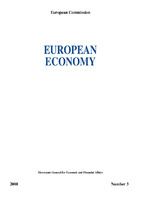European Economy. Public Finances in EMU-2000. European Economy 2000.3
| dc.contributor.author | European Commission |
| dc.date.accessioned | 2020-04-09T13:30:06Z |
| dc.date.available | 2020-04-09T13:30:06Z |
| dc.date.issued | 2000-03-12 |
| dc.identifier.uri | https://ketlib.lib.unipi.gr/xmlui/handle/ket/1670 |
| dc.description.abstract | The aim of this reportAchieving and sustaining sound positions in publicfinances is essential to raise output and employment inEurope. Low public debt and deficits help maintain lowinterest rates, facilitate the task of monetary authoritiesin keeping inflation under control and create a stableenvironment which fosters investment and growth.Furthermore, high public savings will help countries prepare for the budgetary consequences of ageing popu-lations. The Maastricht Treaty clearly recognises theneed for enhanced fiscal discipline in economic andmonetary union (EMU) to avoid overburdening the sin-gle monetary authority and prevent fiscal crises whichwould have negative consequences for other countries.Moreover, the loss of the exchange rate instrumentimplies the need to create room for fiscal policy to tackleadverse economic shocks and smooth the business cycle.The Stability and Growth Pact (SGP) is the concrete man-ifestation of the shared need for fiscal discipline. |
| dc.format.extent | 298p. |
| dc.language.iso | en |
| dc.publisher | Office for Official Publications of the European Communities |
| dc.subject | Economic and Financial Affairs |
| dc.subject | Economic and Monetary Union |
| dc.title | European Economy. Public Finances in EMU-2000. European Economy 2000.3 |
| dc.type | working document |
| dc.publisher.place | Brussels |

